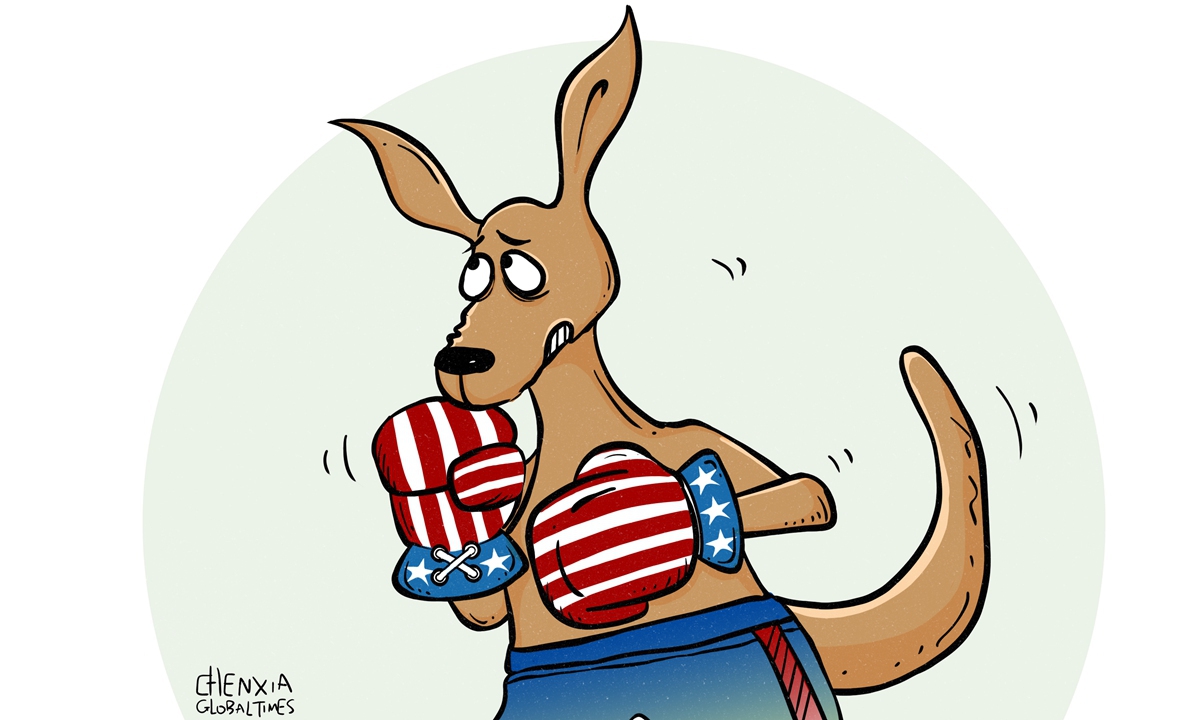2023年7月11日,华东师范大学澳大利亚研究中心主任陈弘在《环球时报》英文版(Global Times)发表文章,谈澳大利亚与美国关系新动向。

Illustration:Chen Xia/GT
In 2018, Malcolm Turnbull, the former Australian prime minister, was becoming more and more perturbed and concerned about the alarming prospect of the "America First" doctrine increasingly taking the center stage in the White House's foreign policy under Donald Trump. In a desperate attempt to salvage Australia's longstanding alliance with Washington, Turnbull coined and promoted a new catchphrase, "100 years of mateship," to encapsulate his interpretation of the nature of the Australia-US relations. The bond between the two Anglophone nations, according to him, is supposedly a partnership that "is as broad as it is deep," and he "look(s) forward to the next 100 years," during which the current bilateral partnership would consolidate in both security and economic terms.
Five years on, it seems Australians now exhibit a diminished enthusiasm for their North American counterparts. Both the recent Lowy Institute poll and the Pew Research poll clearly indicate that a majority of Australians hold greater skepticism or even distrust toward the fabled mythology of the so-called Pax Americana. Nearly half of Australian respondents to the Pew survey now maintain an "unfavourable" view of the US, while a majority of those approached by the Lowy team opted New Zealand as Australia's best friend - only 26 percent still look up to the Americans. 38 percent of Australians think the US doesn't contribute to peace and stability in the region at all.
Such appraisal of the Australia-US relations is far less complimentary than what many people used to think, but statistics don't lie. Australians tend to have become more clear-minded when evaluating what the US relationship means to them, and what the US has done to Australia and its position in the region, and the world.
Since World War II, Australia has always taken the side of the US in major international affairs. Analysts often allude to Harold Holt's pledge of allegiance to the US during the Vietnam war, "all the way with LBJ [then US president Lyndon B. Johnson]," to prove that Australia has a far less independent foreign policy. As the award-winning Australian historian Ross McMullin said, "currying favor with America was seen as a priority."
Recent tactical and strategic developments in the US' obsessive efforts to preserve its regional and international hegemony have somehow influenced many Australians' perception of Washington and eroded their previous naïve confidence in the US alliance. In the words of former Australian prime minister Paul Keating, Australia enjoys "the gift of a continent, our (Australia's) position and proximity to Asia," and Australians need to be clear that the US is "an Atlantic power half a world away" pursuing its own self-interested strategic objectives.
A very recent example is the unfortunate deterioration of Australia's relations with its biggest trade partner, China. Since mid 2017, the recent two US administrations have contrived untoward approaches to bring about discord and, unfortunately, even confrontation with China, effectively sabotaging the previously mutually beneficial comprehensive strategic partnership between China and Australia. Australia's security and foreign policies had simply been instrumentalized and even weaponized to serve Washington's geo-strategic aim to contain, deter and thwart China's development, only to the detriment of Australia's own long-term national interests.
The Pew poll this year in fact reveals that 59 percent of Australians believe that the US has never taken Australia's interests into account when making foreign policy decisions. Sad, but that tells the truth. So much for Turnbull's alleged centennial mateship, which the White House had only half-heartedly paid lip-service to.
Subservience to "the interests of another country" will only invite contemptuous distain and foster insolent disrespect. The previous Australian administration under Scott Morrison recklessly steered Australia into the course of the US' Indo-Pacific Strategy and beat "the drums of war" against China. It is fortunate that the present Albanese government has prudently reversed course and made efforts to avert Morrison's fool-hardy irrational China policies.
Keating made a well-judged and judicious point by stating that "China does not threaten Australia, has not threatened Australia, does not intend to threaten Australia." As a matter of fact, the recent Pew poll indicates distinctly that the majority of Australians now recognize and appreciate China as the world's leading economic power. Australia's cooperation with China has benefited the country's economy, society, and cultural diversity for more than 50 years since the bilateral diplomatic relationship was established in 1972. Such a partnership should, and will continue to endure and flourish with joint efforts from both sides.
The author is president of the Chinese Association of Australian Studies and director of the Australian Studies Centre at East China Normal University. opinion@globaltimes.com.cn